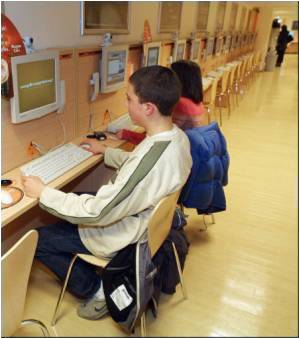Sexy spy Anna Chapman's Facebook photos and Lindsay Lohan's sorrow are known to most Net users but what about Peterporn, Sinta and Jovita? Ever heard of them?

But you probably didn't have a clue why so many of your fellow netizens were tracking them.
So if you're out of the loop, here's an update. Peterporn is a pun on Peterpan, the name of an Indonesian rock band whose singer, Nazril Ariel, 28, was arrested in June over a homemade porn movie which appeared online.
Sinta and Jovita are teenage girls from West Java whose lip-synching performance of an Indonesian pop song, "Keong Racun" (Poisonous Snail), went viral on YouTube in July, attracting more than 1.2 million hits in a month.
You may not care about such pop-culture sensations from a country you normally only hear about when there's an earthquake or terror bombing, but the likes of Google and Yahoo! are keenly following the Indonesian market.
The rapidly developing, mainly Muslim country of 240 million people is emerging not just as an Asian economic power, but as a global Internet power as well, analysts and insiders said.
Advertisement
Budiprasetyo co-founded Indonesian social networking service Koprol which Yahoo! snapped up for an undisclosed sum earlier this year.
Advertisement
Its success can be attributed in part to the staggering growth of Internet use in the archipelago, which emerged from 32 years of military dictatorship in 1998 and is embracing its new-found openness with gusto.
Whereas most people in the West first connected to the Web in the 1990s through a desktop, Indonesians are logging on for the first time via their mobile phones.
They have also leapt straight into social networking sites like Facebook. The country now has the third most Facebook members after the United States and Britain with more than 22 million.
That's one in every 23 Facebook users, going by the site's latest figures. And it's every second Indonesian with access to the Internet -- music to the ears of Facebook founder Mark Zuckerberg.
The Facebook page of the United States' Jakarta embassy has about 143,000 fans, more than three times as many as the State Department itself.
"Users are growing very, very fast. Indonesia is about to explode," Google Asia Business Development director Emmanuel Sauquet said during a visit to Jakarta in June.
"It has very diverse and very active online communities. It's the right place for us to come now. Compared to other emerging countries, Indonesia is the fastest growing country."
Google is collaborating with local wireless broadband Internet company Bakrie Connectivity, whose modem comes with Google Chrome browser as a standard feature.
Bandung Institute of Technology researcher Basuki Suhardiman said that as smart phones became cheaper and the country's middle class grew larger, Indonesia's Internet use would expand exponentially.
"I predict there will be 70 to 80 million Internet users here in 2012," he said, up from 40 million now.
The promoter of Pesta Blogger, an annual get-together for Indonesian scribes, reckons that about 1.2 million Indonesians blog compared to 150,000 in 2007.
The rapid uptake of the Net looks irreversible, but not everyone in Indonesia is thrilled. Some appear to be afraid of the technology and what it means to traditional values.
In a stark illustration of the yawning digital divide, Islamist radicals have called for singer Nazril Ariel's married lover, television presenter Cut Tari, 32, to be stoned to death in public for adultery.
The communication minister, who comes from an Islamic party, has vowed to introduce Web filters to protect the community from smut.
President Susilo Bambang Yudhoyono, asked to comment on the "Peterporn" scandal in June, unleashed a torrent of criticism at the Internet.
"We have increasingly realised that our nation should not stay naked and be crushed by the information technology frenzy, because there will be many victims," he said.
Source-AFP








